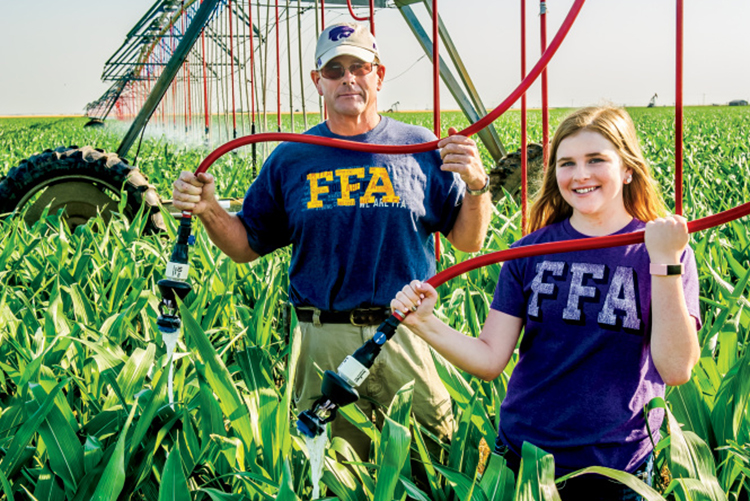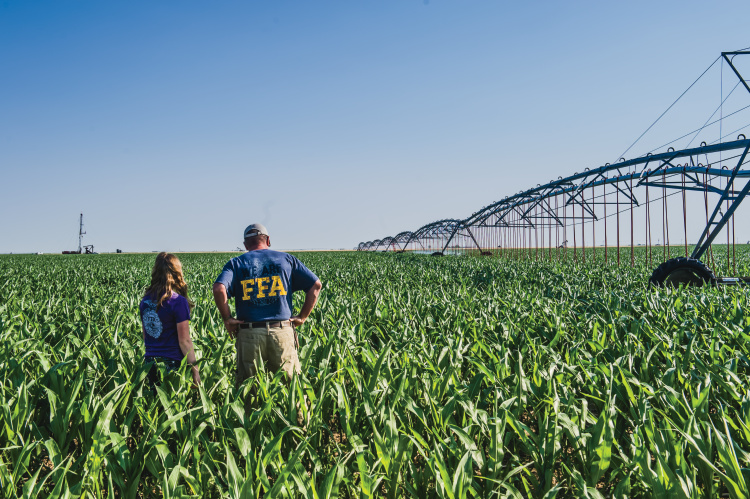Home > Kansas > Kansas Environment > Kansas Growers Embrace New Water Conservation Technologies
Kansas Growers Embrace New Water Conservation Technologies
In partnership with:

In 2013, Governor Sam Brownback tasked his administration with developing a 50-year concept called the Long-Term Vision for the Future of Water Supply in Kansas due to the state’s economic dependence on the finite resource.
That call to action has resulted in a vision with plans that are being implemented across the state, designed to manage, secure and protect a reliable, long-term statewide water supply while balancing conservation with economic growth. Two successful programs within the Water Vision include Water Technology Farms, which are being developed across the state, and Water Conservation Areas, a flexible water management tool chosen by many water right owners.
Water Technology Farms
In conjunction with The Garden City Co., Dwane Roth operates Big D Farms, a Water Technology Farm in northwest Finney County that grows corn, wheat, milo (also known as grain sorghum) and sunflowers.
Thanks to assistance and support provided by the Kansas Water Office and Kansas State University, the farm is outfitted with some of the latest irrigation technologies on the market. For example, Big D Farms has a Dragon-LineTM drip irrigation system, which was launched in 2015 by Kansas-based Teeter Irrigation Inc. The Dragon-LineTM system delivers water and nutrients directly to the area of soil where it can provide optimal plant growth, as well as a bubbler irrigation system known for its precision and durability.
In addition, the farm uses soil-moisture probes that measure the amount of moisture in plants’ active root zones, helping ensure the appropriate amount of irrigation water is added at the right time.
“Before using soil-moisture probes, we didn’t know if our crops needed more water, and we were often overwatering them,” Roth says. “Overwatering pushes fertilizer away from the crops’ roots, but when we only give them the water they need, we’re able to keep the nutrients where they should be. Our crops are thriving like they never have before.”
Along with improving Roth’s yield, employing water conservation technologies on his farm has resulted in cost savings and increased overall profitability.
“The money you save on your irrigation bills using soil moisture probes for just one season will pay for the initial investment,” Roth says. “Plus, you’re conserving water for future generations, and that’s the most important benefit.”

Water Conservation Areas
Established in 2016, the Franklin Family Water Conservation Area in Sherman County is Kansas’ first WCA, which is an option for individuals or groups considering implementation of voluntary, self-determined water-management plans to help conserve water.
As a WCA, the Franklins have committed to limiting irrigated water use to no more than 12 inches or 4,800 acre-feet in each of three consecutive five-year periods beginning Jan. 1, 2016, and ending Dec. 31, 2030.
“We’d been trying to conserve water for several years, and we had not noticed any change or negative impact to our yield,” says Tim Franklin, who primarily grows wheat and corn on his family farm. “That gave us some confidence in becoming a WCA. Also, it’s hard to be against conservation; it’s just the right thing to do.”
To initiate and form a WCA, an area must meet certain criteria, such as having declining groundwater levels, and interested parties are required to submit a proposal to the Kansas Department of Agriculture’s Division of Water Resources.
“I would encourage any eligible farmer in Kansas to consider forming a WCA,” Franklin says. “It offers flexibility as well as stability, and at the end of the day, if we can conserve and add life to our aquifer, it’s our obligation to do it. I want my children to have the opportunity to farm, and this is one way I can ensure it’s a possibility for them.”



